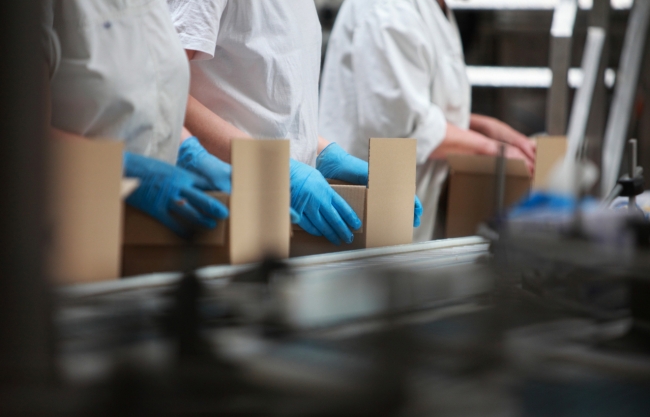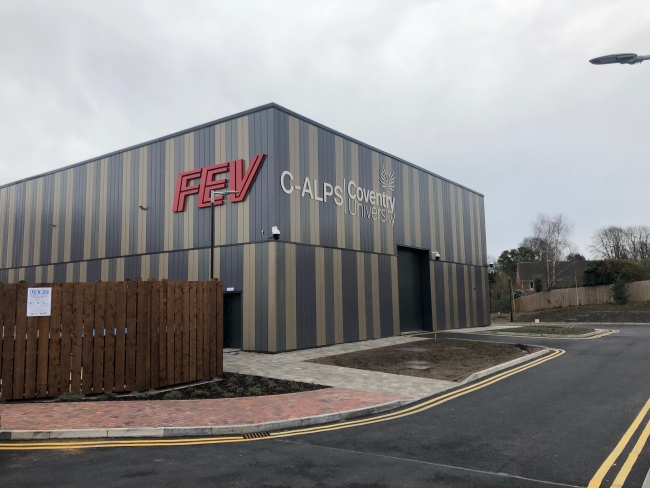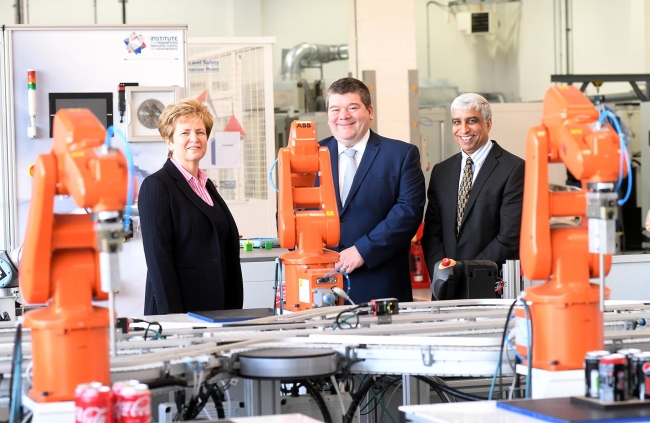The Friday Roundup – 22/03/2019

Every Friday, we round up our top 5 most popular reads from the week, along with sharing some of our favourite finds from around the web.
This week’s roundup sees 120 jobs created with the reopening of a former Scottish food processing plant, AME receives a £5m manufacturing skills funding boost, plus why being less busy may just be the key to getting more done…
Our top 5 most read this week
1. Bhagat to invest £9m at factory in Scotland
Jobs are set to be created at the former Pinneys of Scotland plant in Annan, after it was purchased by food processing company Bhagat Holdings Limited. The Scottish Government, through Scottish Enterprise, has invested £1.7 million through a Regional Selective Assistance grant, to support the company to expand its European interests to Scotland. The company plans to create an initial 120 jobs and has indicated there is the potential for the creation of more jobs in the future. Owner Keshav Bhagat confirmed that production is expected to begin in the autumn and that the company is investing £9 million of capital funding at the site. Rural Economy Secretary, Fergus Ewing, said: “I’m delighted that an international company like Bhagat Holdings has chosen to invest in Scotland, with the immediate creation of a significant number of jobs, which will make a real difference to local people and the local economy. When Young’s closed last summer, I said that we would leave no stone unturned and we would keep working to find a solution and an alternative use for this site. That hard work has now paid off and it is Annan and the local community and families who will benefit.”
Read more
2. £50m C-ALPS centre opens in Coventry
A £50m state-of-the-art facility for creating cleaner mobility has opened in Coventry giving a major boost to the UK automotive industry. The Centre for Advanced Low-Carbon Propulsion Systems (C-ALPS), an innovative collaboration between Coventry University and global engineering specialist FEV Group, is looking to harness cutting-edge academic and commercial expertise to support the development of the next generation of electric, hybrid and combustion engines. Over 30,000 sq ft of purpose-built space will house some of the most advanced internal combustion and electrification test bed facilities currently available in the UK, creating a dedicated resource for testing current and future powertrain solutions quickly and efficiently. The capabilities will be available to OEMs, SMEs in the supply chain and technology partners keen to accelerate the creation of new propulsion systems for use across automotive, aerospace, marine and rail sectors. 36 new jobs will be created initially, with a number of apprentices and graduates from Coventry University already appointed.
Read more
3. Gov’t announces further details of the Tempest aircraft programme
Companies from across the UK defence industry have come together in the first opportunity for suppliers to engage with the Government and Team Tempest partners over the future of Combat Air System development in the UK. The event in Farnborough was launched by Minister for Defence Procurement, Stuart Andrew MP, and saw 300 delegates including SMEs and technology-led organisations attending to build connections and take part in a series of briefings outlining the capabilities and skills needed to shape the future of Combat Air System delivery in the UK. The Tempest programme aims to harness and develop UK capabilities that are critical for Next Generation (NextGen) Combat Air capability and to retain the UK’s position as a globally competitive leader through understanding of future concepts, technologies and capabilities.
Read more
4. AME receives £5m skills funding boost
An innovative collaboration between Coventry University and Unipart Manufacturing Group to equip engineering graduates with the experience and skills employers need in the future is to be extended after receiving over £5 million of funding. The Institute for Advanced Manufacturing and Engineering (AME) – known as the ‘faculty on the factory floor’ – was established at Unipart Manufacturing in Coventry four years ago to provide teaching and research space for Coventry University students. Around 120 students are currently studying at the site and, since AME was launched, 100 per cent of students who have graduated have been employed in engineering jobs. Work is now due to start on refurbishing one of the site’s buildings next month, with a view to it being officially opened by the end of the year. This will include investment in robotics, automation, digital technologies, laser processing and surface engineering – all designed to enhance research and teaching capabilities that will drive increased productivity.
Read more
5. AkzoNobel opens £10.8m R&D innovation campus
A trailblazing lab complex which can test new products in conditions that mimic the world’s most extreme environments has been officially opened by AkzoNobel. Located in Felling near Gateshead, the £10.8m (€12.6m) R&D innovation campus fuses the site’s 115-year history of product development with state-of-the-art facilities designed to keep AkzoNobel at the forefront of the coatings industry. One of the key features of the campus is a new application and testing laboratory. It will be used to test new products in extreme conditions such as temperature resistance, fire and high pressure. The facilities will also enable scientists to expose products to chemicals and corrosion. A comprehensive sustainability plan was at the heart of the design and development of the new complex. Features include solar wall cladding, a sustainable urban drainage system, grey water recycling, photovoltaic panels, air compressor heat recovery, and a sedum “green roof”. The new facility in Felling is located around 25 miles away from AkzoNobel’s €100 million paint manufacturing plant in Ashington, which opened in 2017.
Read more
Our favourite #GBmfg & #UKmfg tweets of the week
Great news: Toyota to build new model for Japanese car manufacturer Suzuki at its Burnaston factory https://t.co/j2AWbbDc3D #UKmfg #GBmfg🇬🇧 pic.twitter.com/y5lGBHbTDh
— Jefferson Group (@Jefferson_MFG) 20 March 2019
Bloodhound makeover! With funding from Ian Warhurst, pictured, the attempt to take the land speed record past 1000mph is back in business. Read more here https://t.co/ZPzBPDGARF @Bloodhound_LSR @BLOODHOUND_Edu @RollsRoyceUK #turbo #engineering #UKmfg #automotive #technology pic.twitter.com/Hf2wtAFcPM
— The Engineer (@TheEngineerUK) 21 March 2019
Machining Acetal bearings for some S800 Wedgegard Torque Limiters going to our distributor in the US. #GBmfg #ukmfg #ExportingisGreat pic.twitter.com/mHdh7t5arP
— Howdon Power #🇬🇧🏭 (@HowdonPower) 19 March 2019
Derby-based rolling stock manufacturer Bombardier to recruit 300 extra staff as it ramps up production and prepares to build a record number of trains https://t.co/SI6crDJHZD @BombardierR_UK #UKmfg #GBmfg🇬🇧 pic.twitter.com/igWU9zRvg4
— Jefferson Group (@Jefferson_MFG) 15 March 2019
CEO Neil Percival and @SuellaBraverman MP break ground on our new state of the manufacturing facility in #Fareham This will help provide additional world class support to our fantastic customers and generate new employment opportunities pic.twitter.com/O0Bwbotx7h
— Percival Aviation (@PercivalAvLtd) 12 March 2019
Recommendation roundup
Our picks of the business and manufacturing related content that caught our attention this week.
1. Future technologies that will drive Industry 4.0 / via @wef
Machines that autonomously detect when they need spare parts. Production systems that run their own quality control during operation, reducing inspection outlays. Robots that autonomously recognize and move components. Scenarios like these are gradually becoming a reality in industrial production. They’re founded on future technologies like artificial intelligence and edge computing. These offer immense opportunities for the discrete and process industries because they open up new business models and productivity potential, as Klaus Helmrich, member of the managing board at Siemens, explores.
Read more
2. BMW pushes on with production of electric Minis in the UK / via @business
BMW is still set to start production of an electric Mini model in the UK later this year, even as carmakers grapple with the implications of the latest twist to Britain’s exit from the European Union. The German automaker has no plans for radical changes to its four UK plants and expects any disruption to just-in-time supply chains to normalise within four to six weeks even after an unnegotiated Brexit, production chief Oliver Zipse said on Wednesday. BMW anticipates tariffs of zero to 5 percent after no-deal split, a development that “won’t change Mini’s business model” or the future of other UK plants, Zipse told reporters. “For us to consider fundamentally changing our production sites in the UK, there’d have to be significantly more severe developments.”
Read more
3. Volvo to ‘challenge established thinking’ by hiring outside auto industry / via @MarketingWeekEd
Volvo’s marketing strategy director, Mike Johnstone, has spent 18 years in the automobile industry, and while he says there are benefits to spending his entire career in the industry, he is keen to hire from outside the sector to encourage new ways of working.
Read more
And finally, some bonus picks to add to your reading list this weekend:
1. Why being less busy is the key to getting more done / via @BritishGQ
Ever spend an entire day “working” only to find you didn’t actually get any work done? This might help explain why:
Read more
2. Why does the London Underground still not have Wi-Fi in tunnels? / via @WiredUK
Want a quick digital detox? In London, all you need to do is take the tube. But, from next year, Transport for London says it will roll out 4G coverage on the underground. It’s a start, but London is still some way behind its big city rivals. Take Moscow’s Metro, where both Wi-Fi and mobile phone network have been available since 2014. But why is London’s connectivity worse than most other public transport systems below ground? And why are the metro networks of other cities not facing the same problems?
Read more
Spot something you think we should see? Share with us! Email hello@zenoot.com and we may feature it in an upcoming post.





